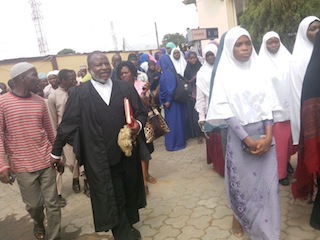LAGOS – A Nigerian court has maintained a ban on Islamic headscarf in Lagos public primary and secondary schools, the decision which infuriated the leaders of the Muslim community, vowing to appeal the ruling.
"We appreciate all the individuals and societies that attend the hearing, [and] we shall proceed to the court of appeal to secure our right [as is] guaranteed by the Nigerian constitution," Kaamil Kalejaiye, the president of the Muslim Students Society of Nigeria (MSSN) told Anadolu Agency after the ruling.
The MSSN brought the case month ago to challenge the ban on wearing the hijab in public primary and secondary schools imposed in May 2013.
In a Friday session at the High Court in Lagos, the judge ruled that the restriction on hijab did not breach students’ civil rights.
"The application fails in its entirety,” the ruling by Judge Modpue Onyeabo, sitting at the High Court in Lagos, was quoted by Agence France Presse (AFP).
"The ban on the use of hijab in public schools in Lagos is not a breach of the applicants’ fundamental rights to religion because Nigeria as a secular state does not adopt any religion as a state religion.
"Removing the ban on the hijab will be tantamount to promoting a particular religion against the others and this may lead to social tensions."
The judge said that Section 10 of the national constitution made Nigeria a "secular state," stressing the government's obligation to maintain neutrality at all times.
She said the Lagos government had been correct in seeking uniformity of the students’ dress code.
"The non-hijab wearing students will feel inferior to those who are putting on hijab," the judge asserted.
"The values of plurality and respect for the rights of others who have subscribed to a non-faith-based educational system cannot be breached. In that effect, the issue is resolved in favor of the respondents and the suit is accordingly dismissed," she added.
Muslim Ire
The general feeling of Muslims’ ire after the ruling was confirmed by the MSSN lawyer, Gani Adetola-Kazeem.
"We are simply not satisfied with the court decision. The angle through which the court has looked at the issue is quite at variance with the provisions of the constitution," the lawyer said.
“We will definitely appeal.”
Islam sees hijab as an obligatory code of dress, not a religious symbol.
The issue of hijab has become controversial in Nigeria’s southwest region where Muslims accuse public institutions of denying Muslim women/girls the right to wear hijab, as allowed by the constitution.
At least three court cases have been instituted at different instances, although a court ruling allowing hijab in public institution does exist.
A few years ago, Lagos authorities have banned the wearing of hijab at schools. The Muslim outfit is also outlawed in most south-western states.
Muslim leaders say that banning the headscarf violates the religious rights of Muslim students as spelt out in the Constitution.
The ruling comes at a critical time for Nigeria's ruling All Progressive Congress (APC), which already faces a possible backlash from Lagos State's sizable Muslim community.
Muslims in Lagos recently launched a "no hijab, no vote" campaign ahead of 2015 state elections, in which candidates’ religions often determine the outcome.
"The slogan of Muslims for Lagos 2015 is 'No Hijab, No Vote.' The hijab here is a symbol of respect for the way of life of Muslims and a commitment by politicians to accept the legitimate demands of Muslims," Ishaq Akintola, director of Muslim Rights Concern, a local NGO, told a press briefing last month.
"These demands will be tabled before candidates when they meet leaders of Islamic organizations," he said.
/129

